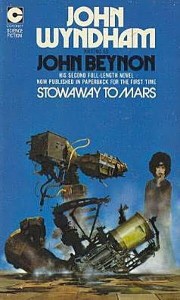Stowaway to Mars by John Wyndham writing as John Beynon, was first published in 1936 as Planet Plane (Newnes Limited, London), then serialised in the periodical The Passing Show as Stowaway to Mars, where it was described as:
an epic serial of the greatest exploration of all … by the man who writes half a century ahead of all the others.
It is set in 1981 when an international prize of £1,000,000 was being offered to the first man to complete an interplanetary journey. Dale Curtance, a British millionaire adventurer takes up the challenge and builds a rocket, the Gloria Mundi. With his crew of four men he blasts off from Salisbury Plain, his destination the planet Mars. Once free of the Earth’s atmosphere they discover a stowaway, a woman, Joan Shirning, the daughter of a professor! She has a strange tale to tell of a machine that her father found, which they believe came from Mars. Having landed on Mars they encounter what appears to be a planet occupied by ‘intelligent self-contained machines’. They claim Mars to be part of the British Commonwealth of Nations, a claim later disputed by the Russians when a second rocket lands.
My copy was published in 1972, with a foreword stating how right John Beynon was in anticipating the international rivalry for the space race.

Stowaway to Mars is a novel of its time, the male crew members discuss what should be done with their stowaway – they can’t just chuck her overboard, as they would a man! They have a condescending attitude to women thinking that her ‘highest duty is motherhood’. She can be creative, concentrate on producing children rather than machines, because women :
simply have not got the imagination to see the machines as we see them, but they have the power to be jealous of them. … There is nothing good they can say for it. It’s noisy, it’s dirty, it’s ugly, it stinks: and anyway it’s only a jumble of metal bits – what can be really interesting in that? (page 98)
There is a lot of discussion about The Machine and its relationship with Humanity, what it means and what use is made of it. Man’s survival depends on his adaptability and must be willing to break with the past. The reason to venture into space is thought to be to make us wiser, to seek knowledge. Wyndham refers to earlier science fiction writers, such as J J Astor’s Journey in Other Worlds, written in 1894 where he states that ‘the future glory of the human race lies in the exploration of at least the Solar System.’ And Dale and his companions speculate about what they will find on Mars:
It’ll be amusing … to see which of the story-tellers was nearest the truth. Wells, with his jelly-like creatures, Weinbaum, with his queer birds, Burroughs, with his menageries of curiosities, or Stapleton, with his intelligent clouds? And of the theorists, too. Lowell, who started the canal irrigation notion, Lutyen, who said that the conditions are just, but only just, sufficient for life to exist at all. (page 67)
Even though this book is so obviously dated and contains quite lengthy sections theorising about machines, and the existence of life on other planets, I did enjoy it immensely. I really liked the descriptions of Mars, including its history and the reason for the construction of the canals, and the interplay between the characters, although some of them are only sketchily drawn and I couldn’t distinguish between them very easily.
The book ends on an intriguing note, referring to a subsequent tale. To say more would spoil the ending, at least it would have done for me. I don’t think Wyndham actually wrote a sequel, although there is a short story, Sleepers of Mars which deals with the Russians left stranded on Mars.
John Wyndham’s (1903 – 1969) full name was John Wyndham Parkes Lucas Beynon Harris, and he wrote under several different pseudonyms – John Beynon, John Beynon Harris, Wyndham Parkes, Lucas Parkes and Johnson Harris.
I’ve had this book for a few years, so it qualifies for Bev’s Mount TBR Challenge and it is the second book I’ve read for Carl’s Science Fiction Experience. It was a really good read and it has got me so interested in finding out more about the history of science fiction itself!
Well goodness, that’s one of Wyndham’s books I’d not heard of. Not that I knew as a teen that he has pseudonyms and thus didn’t know there were other books I should look for. This one sounds interesting for the reason you state… that of being an early sci-fi novel with very different values to those which we have now.
LikeLike
Margaret – Thanks for the fine review. You’ve reminded me that I don’t read enough science fiction. It’s a genre that has evolved so much over time, and I really ought to get to know it better.
LikeLike
I knew he wrote as John Beynon, but had no idea he wrote under all those other names too! Must look out for some of them…
LikeLike
I hadn’t realised that Wyndham wrote under other names and I’d go rushing off to find this if it wasn’t for the fact that I think his attitude to women might have me tearing the book to shreds. I’ve never quite understood why libraries get so annoyed when you do that 🙂
LikeLike